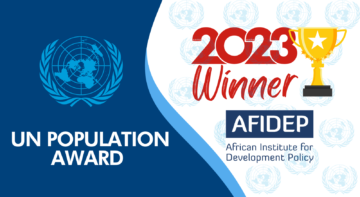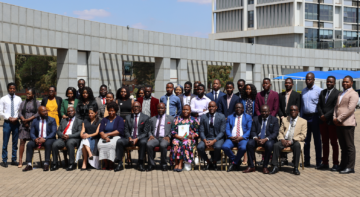News

The workshop – Using Evidence to Improve Policy Implementation – kicked off successfully yesterday morning in Nairobi, with government teams from 9 countries represented including Kenya, Malawi, Nigeria, Ghana, Rwanda, Chile, Mexico, South Africa and Uganda.
Modelled as a “peer-learning workshop for government policymakers’, the event began with a conversation on the art, science, and morality of using data in decision-making between Prof. Bitange Ndemo, a former Permanent Secretary at the Kenya Ministry of Information and Communication, and Dr. Eliya Zulu, AFIDEP’s Executive Director.
During this session, Prof. Ndemo, an ICT expert and big data champion, and a professor at the University of Nairobi, spoke on the various dynamics involved in ensuring that data and evidence are considered in policy formulation and implementation. He said that during his tenure as Permanent Secretary, he conducted his own research with assistance from his colleagues at the University of Nairobi, to make the case for some of the groundbreaking ICT initiatives his Ministry led, including the innovative mobile money transfer technology, M-Pesa.
This point illustrated the weak supportive institutional structures and mechanisms for top policy-makers in finding and using evidence in decision-making in Kenya and, likely, in other African countries. Prof. Ndemo considered himself lucky because he came from academia and had extensive research skills as well as support from the university, but his counterparts who lack these skills and support struggle to find and use evidence in their work.
With this state of affairs, he lamented that many African governments have resorted to bringing in consultants to draft policies in relative isolation, which governments take on board to implement without critical interrogation. This, he noted, was one of the factors why policy implementation fails.
“Our governments have not taken up the ‘triple helix’ concept where governments work closely with universities and the private sector in implementing policies. This would enable access to a lot of data that government is holding but not using that would be analysed by academia to inform decisions”, he said. “This would also provide government access to data and evidence from the private sector and universities, which is important for decision-making,” he added.
He challenged government officials implementing policies to ask critical questions about data on the issues they are tackling. Said he, “we need to change the current culture to a culture of asking critical questions, the right questions about evidence and data on the issues that we are facing. You cannot do anything right without data.”
So what can African governments do to improve policy implementation? His response: “Our governments need to free up all the data they are holding and not using. When data is freed up, people will scrutinize it and use it”. He added that Kenya, for instance, now has a lot of data on counties, which, if freed up for analysis and scrutiny, could help address a lot of the development challenges in the counties. Of course, he cautioned that there are big issues around data protection, which African countries need to leverage lessons from Europe on how they are handling these.
Dr. Rose Oronje, Director, Science Communications and Evidence Uptake at AFIDEP, thereafter led a session that explored the theoretical frameworks that underpin policy implementation, while making comparisons with the reality of implementing policies in developing countries. She noted that most of the focus that existing literature on policy implementation has been dedicated to the reasons why implementation fails, and not enough on when and why it succeeds. She highlighted the debate on the “top-down” and “bottom-up” models of policy implementation, noting that scholars had moved on to hybrids of these models. She presented five models proposed in the last couple of years, which participants used in an exercise to interrogate the reality of policy implementation in their countries against these models.
In conclusion, Dr. Oronje noted that policy implementation is greatly shaped by the context in which it happens, and resource-poor countries have more challenging contexts for policy implementation. The often inadequate resources for policy implementation, and the little involvement of policy implementers and citizens in policy formulation, further complicate the policy implementation challenges. She ended by noting that policy implementation is complex and so we need to continuously think about how data and evidence could play a role in improving the process.
Participants at the opening leg of the workshop yesterday also had the opportunity to present case studies of the policies they’re working on in their countries, and share lessons learnt. One such lesson was the importance of respecting the various contexts that exist in the countries the policy is to be implemented in. Simply put, a solution that has been deemed to work in one country may not be successfully implemented in another country without adjusting for the existing social, political, cultural, religious contexts in that country that could potentially make or break the implementation of that policy.
Participants were also urged to design policies that allow for synergy and coordination. Generally, policies don’t work in isolation, especially when they involve the government as the actor to carry out the implementation. In government, there are various ministries and departments, and they often have cross-cutting mandates and interests that might go unacknowledged in a policy’s implementation plan. For a policy to be implemented effectively, it should build in provisions that specify the actors that need to be involved in its implementation, and also describe each actor’s roles and level of involvement, taking into account both their unique and related mandates and interests.
Related Posts




